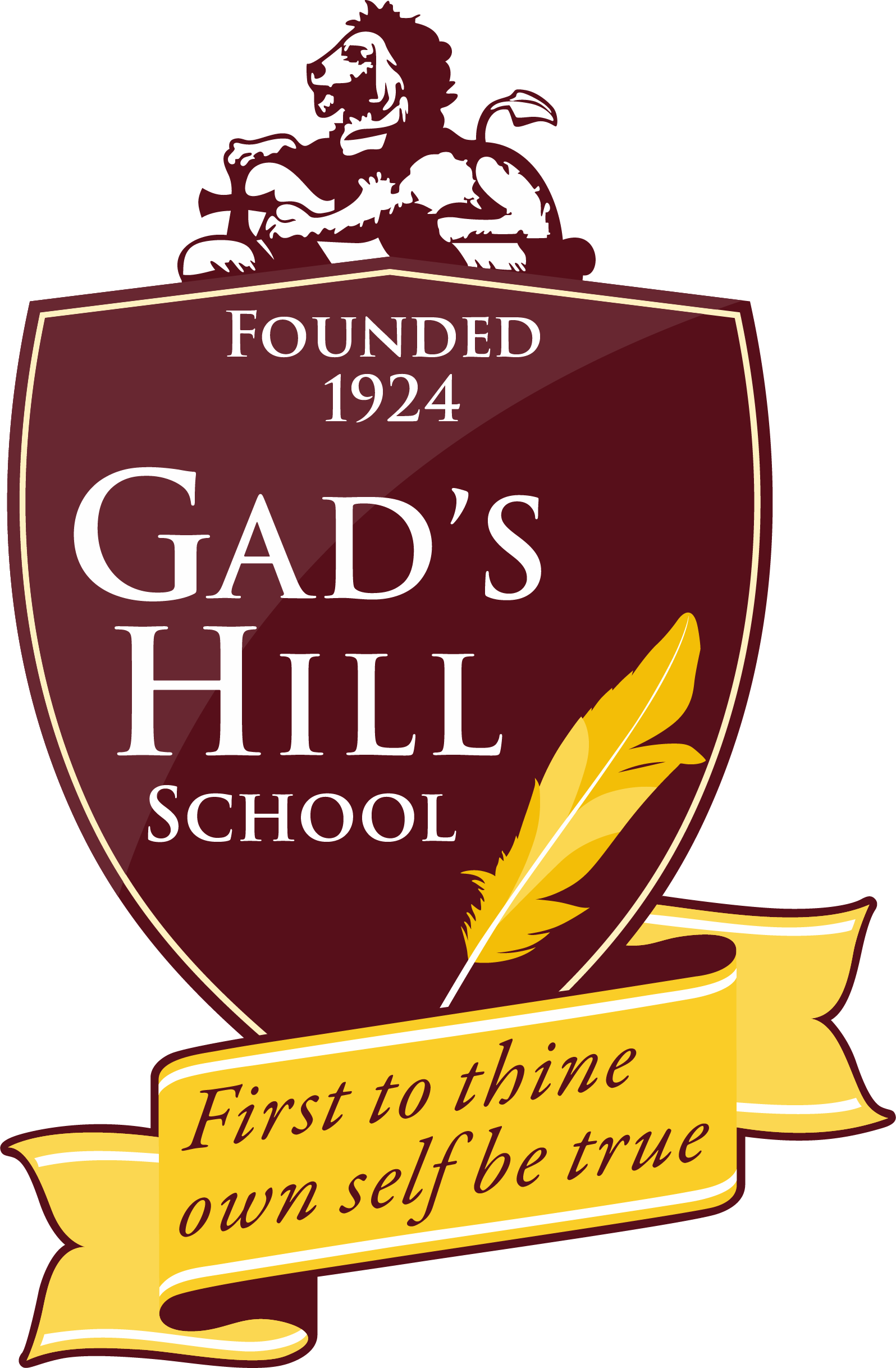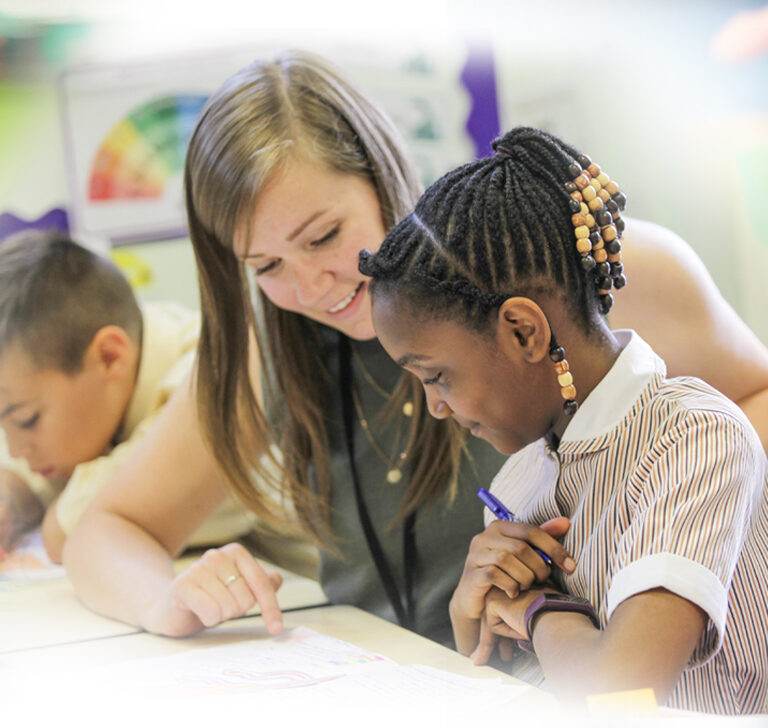English is an essential part of the One Curriculum because, through development of literacy and oracy skills, it facilitates success across all subjects. English teaches our pupils to communicate ideas and to listen to and learn from others. Through study of English, our pupils are exposed to challenging and diverse literary works that broaden an understanding of human nature and our relationship with the world around us.
Lower School – Key Stage 1
Reading in the Kindergarten
Reading is the cornerstone of the Lower School curriculum. Learning to read begins in our vibrant and creative nursery setting where children develop a love of reading and language through poetry, songs, story times and early phonics sessions.
Throughout the Kindergarten, early reading is developed using a balanced approach that focuses on both language comprehension and decoding. When learning to decode words, children receive tailored small-group teaching which ensures every child is supported and challenged to become a fluent, confident reader.
Spelling in the Kindergarten
At Gad’s Hill School, we believe confident spellers become confident writers. Spelling is a key part of The One Curriculum, supporting success across every subject.
Throughout the Kindergarten, children explore all the sounds (phonemes) and letters (graphemes) of the English language through expert phonics teaching. This early focus lays strong foundations for future learning. Children are taught to apply their phonic knowledge to spell both familiar and unfamiliar words.
Writing in the Kindergarten
Writing is a powerful tool for creativity and communication. From the earliest stages, children are encouraged to find their voice and develop confidence in using it. Within EYFS, pupils begin their writing journey through mark-marking and early storytelling.
As they progress, children explore and create a variety of fiction and non-fiction text types: our approach combines structure with inspiration. Using high-quality texts, modelled writing, and rich discussion, we spark ideas and deepen understanding.
Lower School – Key Stage 2
Reading in the Juniors
As children progress into the junior phase, they are explicitly taught a range of comprehension skills and develop broad vocabularies through the study of increasingly challenging works of literature.
Children can expect to enjoy a diverse and exciting range of modern and traditional, high-quality stories, non-fiction texts and poems which inspire their own creative writing and spark a lifelong love of reading. Across the school, we are proud to have three well-loved and well-stocked libraries, as well as each Lower School classroom having an inviting reading area of its own.
To enrich this experience, we place a strong emphasis on oracy. Through workshops, debates and collaborative presentations, children learn to explore literary works and deepen their understanding, developing confidence in speaking and learning through talk.
Spelling in the Juniors
As they move through the juniors, children continue to benefit from a rigorous phonetic approach to teaching spelling, directly building on and applying what has been learnt during the kindergarten and carefully designed to meet the National Curriculum expectations.
With regular practice, personalised logbooks, and structured support, children are challenged to grow their skills step by step. Engaging activities make spelling fun and meaningful, helping pupils understand that spelling is more than writing words correctly – it’s one of the foundations for clear communication, creative expression, and academic achievement.
Writing in the Juniors
Throughout the junior phase, children learn to write through in-depth study and deconstruction of high-quality texts and modelled written work. Writing is woven throughout our curriculum, with purposeful opportunities to write from real audiences and across of a range of genres.
Grammar, punctuation and spelling are taught explicitly and applied meaningfully, enabling children to write with accuracy and flair.
Through writing, pupils develop essential skills: creativity, resilience, critical thinking and empathy. They learn to reflect, edit, and take pride in their work – preparing children not only for academic success, but for confident communication in the wider world.
Upper School – Key Stage 3
Confidence in English is, quite simply, the bedrock on which all other subjects are built. Without it, success in all other aspects of a pupil’s learning is likely to prove elusive; without it, success in later life may yet prove a challenge; it is the key skill!
Staff in the Upper School English Department believe firmly that the following objectives are central to developing a fully literate young person in the first half of the twenty-first century:
- That all pupils write effectively, generating engaging ideas and communicating clearly with their readers. They should possess a wide vocabulary and should be able to spell and punctuate accurately and with confidence.
- That all pupils develop the ability to read fluently and are comfortable responding to a wide range of texts. Pupils are exposed to quality writing from all periods, whether it is as poetry, prose or drama. The writers they encounter in the Upper School range from Shakespeare, Donne, Dickens and Orwell to contemporary poets such as Simon Armitage and Raymond Antrobus.
- That all pupils can speak and listen effectively and with confidence.
- That all pupils are introduced to a range of non-fiction texts and other media, including film and digital texts.
- That all pupils recognize that the literacy landscape is changing. Nothing stays the same, least of all what we read and write, and they will need to be able to adapt.
We believe that lessons should be challenging, with plenty of opportunities for critical thinking. To further support the children, we recently launched our ‘Fostering a Love of Reading and Writing’ initiative and, to boost confidence, encourage them find outlets for the wider publication of their work. Classroom lessons are supported by trips and visiting speakers, the latter having previously included Chris Priestley, Terrell the Artist and historian, Lucinda Hawksley.
So, do the pupils, relish their time with us? We’ll let an Upper Shell student answer that one:
“In English lessons you can lose yourself in the world of your imagination, you can recreate history and you can create a distant future.”
Upper School – Key Stage 4
Having established the foundations for future success in English in Upper Shell and the Lower 4th, our Key Stage 4 pupils focus their attention upon the GCSE examinations at the end of the Upper 5th. At that point, they will sit exams set by Eduqas, a board we have chosen because it is pupil-friendly and supportive, whilst giving students the opportunity to truly excel.
Pupils start the Upper 4th by acquainting themselves with the work of Shakespeare, via his great tragedy, “Macbeth”, before studying a pair of GCSE-level literary texts, R.C. Sherriff’s World War I-set “Journey’s End” and Susan Hill’s gothic ghost story, “The Woman in Black”. Preparation for the ‘unseen poetry’ section of the English Literature GCSE is followed by work that will equip them specifically for the English Language qualification.
In the Lower 5th pupils study “Romeo and Juliet”, “An Inspector Calls” and the poems found within the exam board’s anthology. They continue to hone their skills and understanding for the English Language papers and analyse a nineteenth century novel; this is usually, and appropriately, “A Christmas Carol”.
Much of a pupil’s time in the upper 5th is spent revising and undertaking exam practice. They will additionally have to make a presentation to their peers, which is filmed, graded and included on GCSE results certificates.
As with Key Stage 3, we believe that lessons should be demanding and that pupils find themselves faced with opportunities for critical thinking. They should become more effective readers, writers, listeners and speakers: young people who are ready for the challenges ahead of them. Their success in English should go hand in hand with success across the curriculum, as they become more confident and resilient.
Weekly ‘Drop Everything and Read’ sessions continue in both the Upper 4th and the Lower 5tgh, and pupils are encouraged to draw upon our ‘Fostering a Love of Reading and Writing’ initiative, which has a distinct section for the children in those year groups.
Those who require extra support may find themselves invited to weekly interventions and all are expected to attend after-school grade-booster sessions in the time leading up to their final examinations. Classroom lessons continue to be supported by a variety of visiting speakers, including academics from the University of Kent, and by trips, including the ever-popular “GCSE Poetry Live!”


